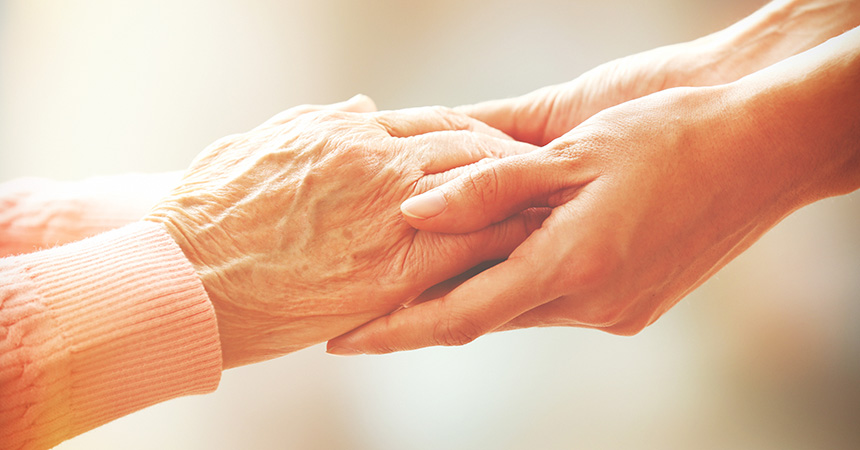How to help elderly Americans during COVID-19
By Alex Branch and Diane Smith-Pinckney
Elderly Americans are at a greater health risk from COVID-19 and likelier to struggle with the isolation of social distancing. How can the rest of us help them?
“I grew up in a row house in Philadelphia where everyone knew each other and checked up on the people around them,” said Janice Knebl, DO, MBA Regents Professor and Director of the HSC Center for Geriatrics. “That’s the mindset we should embrace right now – be aware of older people living around us and do what we can to safely help them get through this.”

Elderly people are more likely to rely on others for help with daily tasks, such as taking proper medications, eating healthy, physical activity, shopping or hygiene. They are less likely to use the internet or social media and may miss important information from health agencies.
Dr. Knebl and other HSC experts shared advice on how caregivers and family members can help older people stay physically and mentally healthy during this crisis.
Eating healthy
Seniors often live on fixed incomes and have limited transportation to get to grocery stories. Recent panic buying left many older people overwhelmed and unable to find food and household supplies.
“People are swarming around them and getting to the healthy items first,” Dr. Teresa Wagner, HSC Assistant Professor and Clinical Executive of SaferCare Texas. “People should be aware of seniors shopping alongside them and extend some help.”
Many grocery stores reacted by establishing shopping times for seniors. It is important that seniors managing chronic illnesses buy food that allows them to eat balanced meals that include fruits, vegetables, protein, grain and dairy. Some ideas to help can be found on the SaferCare Texas blog. The U.S. Department of Agriculture’s MyPlate guidelines offer an app with helpful tools like how to eat healthy on a budget.
Interactions with older relatives
Social distancing can be difficult if high-risk loved ones live under your roof or depend on you for everyday help. The Centers for Disease Control and Prevention recently recommended precautions to take to help protect those loved ones, said HSC Epidemiologist Diane Cervantes, PhD.
- If others in your home are at particularly high risk for severe illness from COVID-19, consider extra precautions to separate your child from those people.
- If you are unable to stay home with your child during school dismissals, carefully consider who might be best positioned to provide childcare. An older adult, such as a grandparent or someone with a chronic medical condition, may not be the best choice.
- Postpone visits to see older family members and grandparents. Connect virtually or by writing letters and sending via mail.
Stress and fear
You don’t have to be older to feel stress and anxiety over COVID-19. But fear can be exacerbated among the elderly living alone or managing chronic diseases.
The HSC Center for Geriatrics recently shared some tips in a newsletter.
- Stay informed but take breaks from reading, watching, or listening to news stories.
- Practice deep breathing, get plenty of sleep, limit alcohol consumption and find ways to exercise regularly.
- Continue to do activities that you enjoy but be mindful of social distancing.
- Connect with family or friends and share your feelings about the situation.
Helping those with dementia
Dementia increases the risk of transmission as its victims may forget recommendations for prevention behaviors and social distancing. Dementia is often accompanied by other chronic health conditions and having an illness can make cognitive impairment worse.
COVID-19 is causing many families and caregivers to change their routines – and routines are extremely important to the well-being of persons with dementia, Dr. Knebl said.
“What’s really important is that once we all establish our new routines in the world of COVID-19, we stay as consistent as possible to those new routines,” she said.
The Alzheimer’s Association also offers tips for dementia caregiving in the home:
- Communicate with healthcare providers about any chances in cognitive behaviors.
- Provide extra reminders about preventive behaviors, like washing hands.
- Make a plan and prepare for illness.
Assisted living communities
Family members may encounter limited visiting availability for loved ones in assisted living communities. If unable to visit, Dr. Knebl suggests working with staff to arrange communication, such as phone calls or video chats. Family members also should inquire to staff about what is being done to protect residents from transmission.
Don’t forget their resiliency
Dr. Knebl was surprised recently while visiting her father, who lives in a retirement community, by the practical approach taken to the COVID-19 pandemic by him and many other residents. The oldest Americans have seen hard times before, such as wars and economic downturns.
“They remember when doctors made house calls and you didn’t go to the hospital when you were sick,” Dr. Knebl said. “I don’t know if other geriatricians are seeing this, but it is a reminder that our older generation is very resilient.”
To subscribe to the HSC Center for Geriatrics newsletter, visit the website and click “Subscribe to Our Newsletter”: unthscstaging.wpengine.com/geriatrics







Social media